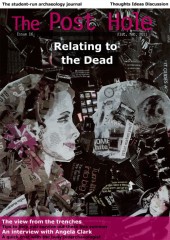With the spring term at York University now more than half completed, the thoughts of first years may well be turning towards excavation in the summer term. So now might be a good time to share some thoughts and memories of the university excavations of 2010.
Weather With You
The first thing to note is that the Great British weather is likely to be the greatest enemy any of you could face in the weeks on site. May Day bank holiday 2010 saw sun, wind and hail (the latter on four occasions during the morning) all available at Heslington East. So forget Nazis, Soviet spies and rival archaeologists, instead be prepared for anything the forecasters cannot forecast. There was a good reason Indiana Jones never dug in Britain!
2010 will not live long in the memory for its long hot summer, as it did not really have one. But it was just long enough to last through most of the excavation period. Long hot days do not just make for uncomfortable working conditions, they also make the ground iron hard: therefore digging is that much more difficult. Some of the most precious items you could find on site are that of sunscreen and bottled water.
But when the rain did finally arrive last summer, it arrived in style! The final two days were wet and muddy, though we battled on and excavation continued anyway. Do not expect that three raindrops allows you to pack up and head for home, because it will not happen...
Be Prepared!
Remember the old scouting motto and you will not go far wrong. Some trowels are provided, but having your own would be a definite advantage, though it is advisable to find some way of marking it so you know it is yours, should it get mixed up with a few others.
You will all get briefed on clothing and what to bring and what not, but I would suggest a couple of extra pieces for the trainee archaeologists kit. Finger-less gloves, of the type used by cyclists, are a definite boon. You will be working for weeks with your hands and the gel pads in the palms will cushion the impact of mattock and trowel day in and day out. And as you will be doing a lot of that work on your knees, a good pair of strap-on knee pads will also be useful.
Something else to consider...a camera. You will most likely need something to illustrate your field journals, and a camera is also good as a memory aid. Now, where did I leave mine?
The Grass Is Always Greener...
Only one person on any archaeological dig can ever find Excalibur, or the entrance to Atlantis, so when you have been scratching around for two days and all you have found is a Victorian clay pipe stem and half a house brick, you will likely be a bit envious of all the pottery and coins coming out of the next trench. But do not despair, because whatever you find, it is all archaeology. Yes, even the 'post-Roman' plastic field drain cutting through the Roman ditch I was working on last summer! Days were spent excavating this mysterious feature that cut across the Roman ditch, until the truth was finally revealed. But it is all part of the rich pattern of archaeology and the field drain got tidied up and recorded with the same care as if it had been a Roman feature.
Even though Area A (the 40 by 40 metre section where I was working) was quite devoid of 'stuff', it still produced a handful of good finds, including a double Roman pot discovered in a ditch terminus. This find was one pot, with another larger pot placed upside down over it, and could have contained a cremation, though the ashes would have washed away long ago. Not exactly the Ark of the Covenant, but a very nice find.
Taking One For The Team
Teamwork. Probably the single most important part of the learning curve of the excavation term. Archaeology is a big department at York, with almost a 100 people in their second year and up to a 120 in first year. I am now halfway through my degree course and I still do not know about a third of the people in my year. So having been assigned to a team of people, some of whom you have only passed in the refectory or the courtyard, is a chance to make new and lasting friendships that you might not otherwise do.
You will find you have more in common with some of your new teammates than you ever thought possible. Bonds will be forged through adversity and triumph, through sun and rain, through lunchtime and afternoon break. You may also discover new skills, not just in your new friends, but also in yourself.
A Funny Thing Happened On The Way To The Dig...
Whatever happens out in the field, do not forget to have a laugh about it! Whether it is during the break, walking off site at the end of the day, in the pub afterwards or on Facebook, humour is the best antidote to a day of aches, pains and soggy boots. Find one thing funny and the day will not seem quite so bad.
However you get your laughs, be it getting your mates to do funny poses for the camera, a colleagues' amusing item of clothing, recreating moments of history using pistachio shells or giving your features interesting names, funny incidents make any day better and pass quicker. It is a proven scientific fact, honest!
The Joys of Ex
Of course, once the digging is done, the last find has been bagged, the final mattock stowed away until summer 2012, the post-ex session arrives. This gives the archaeology students a chance to do some more detailed analysis on the finds so carefully removed from their soily prison just a short time before.
For the 2009/10 intake, this took on four basic formats: sample processing (including sieving dry soil samples and 'floating' wet ones), finds washing (the pottery, glass and bone, but not metal or wood), excavation records (putting together a plan of the site) and preparing for the end of term exhibition.
This is a chance to be reunited with your best find of the dig, the section/plan drawing you did out in the field, or to learn more about the scientific processes used by archaeologists. Plus this is a great time to catch up with your newfound mates from the excavation, sitting around in the sunshine and handling the find, to reflect on the academic year gone by and look forward to the summer holidays.
I will leave you with one final piece of advice: Have fun out there!








